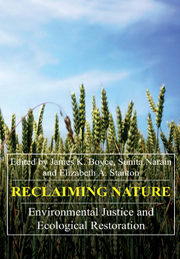Introduction
Published online by Cambridge University Press: 05 March 2012
Summary
Reclaiming Nature offers a hopeful new vision of the relationship between people and nature. The contributors to this volume have nothing in common with the see-no-evil optimists who dismiss the reality of the world's mounting environmental problems. But neither do they succumb to the bleak pessimism of many ‘environmentalists’. Charting a course between denial and despair, they realize that human activities can have positive impacts on nature's wealth as well as negative ones. The crucial question is how we can tip the balance in favour of the positive.
The relationship between humans and nature is shaped by relationships among people. To understand what we do to nature, we must ask who does what to whom. Among the myriad species on Earth, we are distinctive not only in our power to use reason and learn from experience, but also in the fact that we live in differentiated societies where some, in George Orwell's phrase, are ‘more equal than others’. Not everyone has the same impact on the environment, nor do all bear the same environmental consequences. The distribution of environmental benefits and costs has profound effects on our overall environmental impact.
This book puts forward three core propositions:
First, environmental degradation is not the result of an inherent conflict between humans and nature; it is a result of conflicts among people.
Second, every person has an inalienable right to share in nature's wealth, including the right to a clean and safe environment.
Third, we do not face a grim choice between protecting the environment and reducing poverty. Instead the two can, and often must, go together.
- Type
- Chapter
- Information
- Reclaiming NatureEnvironmental Justice and Ecological Restoration, pp. 1 - 20Publisher: Anthem PressPrint publication year: 2007



